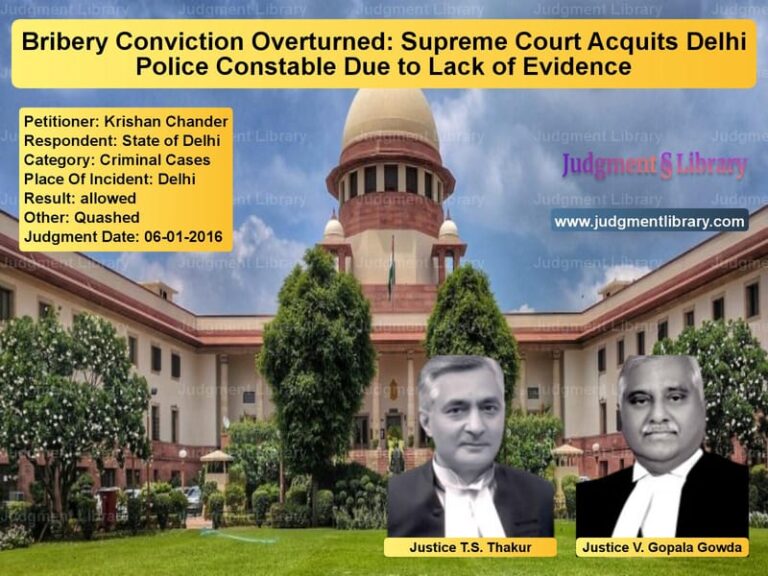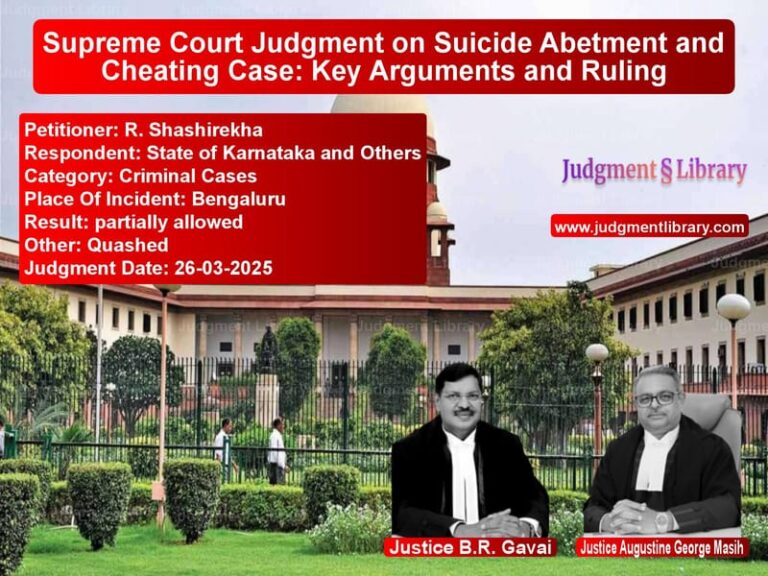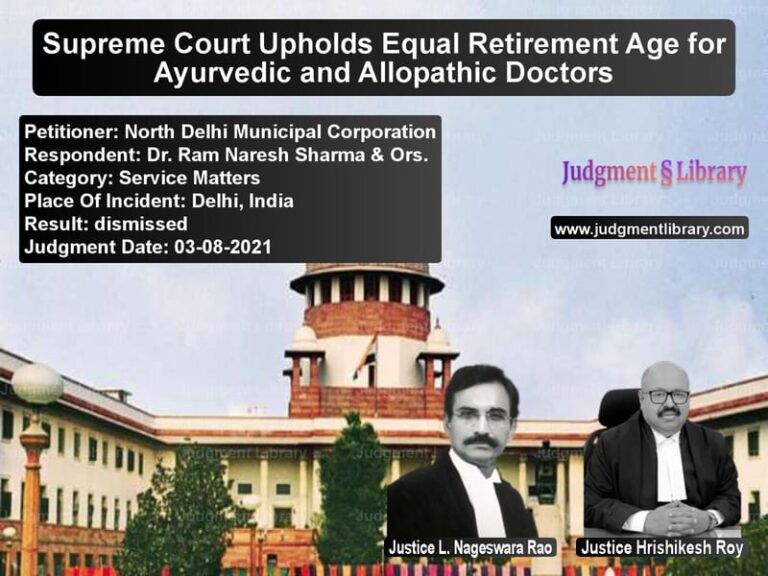Supreme Court Reduces Sentence in Abkari Act Violation Case: Gopinathan v. State of Kerala
The Supreme Court recently ruled on an important case concerning illegal liquor manufacturing under the Kerala Abkari Act in Gopinathan v. State of Kerala. The case revolved around whether the conviction and sentence of the appellant under Section 55(g) and 8(1) read with 8(2) of the Abkari Act were justified. The Supreme Court upheld the conviction but reduced the sentence considering the prolonged duration of the case and the appellant’s advanced age.
This judgment is significant in interpreting sentencing principles and balancing deterrence with proportionality in punishments.
Background of the Case
The case originated from an incident on February 25, 2007, at 9:10 AM when the Perunad Police in Ranni Taluk, Kerala, raided a location and found Gopinathan and others engaged in manufacturing illicit liquor (arrack). Upon seeing the police, all but Gopinathan fled the scene. The police seized:
- 40 liters of arrack stored in two jars of 20 liters each.
- 3750 liters of wash stored in 250 tins of 15 liters each.
Samples were collected for evidence, and the remaining wash was destroyed on site. Gopinathan was arrested, and a case was registered against him.
After completing the investigation, the prosecution filed a charge sheet against seven accused, including the appellant, under Sections 8(1) read with 8(2) and 55(g) of the Abkari Act. During the trial, one of the accused died, leading to the abatement of proceedings against him.
Trial and Conviction
The Sessions Court found Gopinathan guilty of the charges and sentenced him to:
- 5 years rigorous imprisonment under Sections 8(1) read with 8(2) and 55(g) of the Abkari Act.
- A fine of ₹1,00,000 for each offense.
- In default of fine payment, an additional one year of rigorous imprisonment.
- Both sentences were ordered to run concurrently.
The co-accused were acquitted due to insufficient evidence.
High Court Proceedings
Gopinathan appealed to the Kerala High Court, which upheld his conviction based on the testimonies of prosecution witnesses PW-1 and PW-3. However, considering mitigating factors such as his age and the time elapsed since the incident, the High Court modified his sentence:
- Reduced imprisonment from five years to two years.
- Fine remained ₹1,00,000 on each count.
- Default sentence reduced to six months imprisonment for non-payment of fine.
Petitioner’s Arguments
Gopinathan challenged his conviction in the Supreme Court on the following grounds:
- The prosecution did not establish his direct involvement in liquor manufacturing beyond reasonable doubt.
- The seizure of illicit liquor and equipment was conducted without proper compliance with procedural safeguards.
- The testimonies of witnesses were contradictory and failed to prove his guilt conclusively.
- Given the 15-year delay in trial proceedings and his old age (63 years), his sentence should be reduced further.
Respondent’s Arguments
The State of Kerala countered that:
- The evidence presented, including eyewitness testimony and forensic reports, conclusively proved Gopinathan’s involvement.
- The High Court had already granted leniency by reducing his sentence.
- The offense was serious in nature, involving a large quantity of illicit liquor, and warranted strict punishment.
Supreme Court’s Observations
The Supreme Court upheld the conviction but noted several mitigating factors:
“Taking into consideration the overall aspect of the matter and the fact that 15 years have elapsed from the date of the incident, along with the absence of criminal antecedents, we find it appropriate to modify the sentence.”
The Court observed:
- The case had been delayed for 15 years due to institutional lapses.
- There was no evidence of prior criminal involvement by the appellant.
- Given his age (63 years), prolonged incarceration was not warranted.
Final Judgment
The Supreme Court modified the sentence as follows:
- Reduced imprisonment from two years to one year.
- The fine of ₹1,00,000 on both counts remained unchanged.
- Default sentence for non-payment of fine reduced to six months of simple imprisonment.
Conclusion
This ruling reaffirms the Supreme Court’s approach to sentencing, balancing deterrence with proportionality and individual circumstances. While ensuring that serious offenses under the Abkari Act are punished, the Court acknowledged the impact of prolonged trials and the accused’s advancing age. This decision serves as a precedent for future cases involving sentencing considerations in long-pending matters.
Petitioner Name: Gopinathan.Respondent Name: State of Kerala.Judgment By: Justice Ajay Rastogi, Justice C.T. Ravikumar.Place Of Incident: Perunad, Ranni Taluk, Kerala.Judgment Date: 22-06-2022.
Don’t miss out on the full details! Download the complete judgment in PDF format below and gain valuable insights instantly!
Download Judgment: gopinathan-vs-state-of-kerala-supreme-court-of-india-judgment-dated-22-06-2022.pdf
Directly Download Judgment: Directly download this Judgment
See all petitions in Fraud and Forgery
See all petitions in Judgment by Ajay Rastogi
See all petitions in Judgment by C.T. Ravikumar
See all petitions in partially allowed
See all petitions in Modified
See all petitions in supreme court of India judgments June 2022
See all petitions in 2022 judgments
See all posts in Criminal Cases Category
See all allowed petitions in Criminal Cases Category
See all Dismissed petitions in Criminal Cases Category
See all partially allowed petitions in Criminal Cases Category







